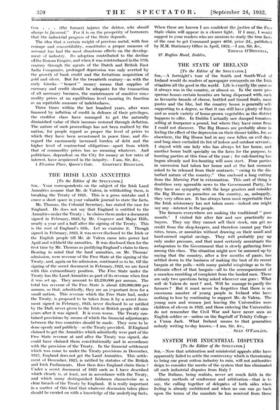THE IRISH LAND ANNUITIES
[To the Editor of the SPECTATOR.] SIR,--Your correspondents on the subject of the Irish Land Annuities assume that Mr. de Valera, in withholding them, is breaking the Treaty of 1921. This is a gross mistake and I crave a short space in your valuable journal to state the facts.
Mr. Thomas, the Colonial Secretary, has stated the case for England. He does not say that England is entitled to the Annuities under the Treaty ; he claims them under a document signed in February, 1923, by Mr. Cosgrave and Major Hills, nearly a year and a-half after the signing of the Treaty. This is the root . of. England's title. Let us examine it. Though signed in February, 1923, it was never disclosed to the Irish or the English people till Mr. de Valera came into power last April and withheld the annuities. It was disclosed then for the first time by Mr. Thomas as justifying England's claim to them Bearing in mind that the land annuities, on Mr. Thomas' admission, were revenue of the Free State at the signing of the Treaty, and, again on his admission, continued so to be, till the signing of the secret document in February,1923, we are faced with this extraordinary position. The Free State under the Treaty has the Land Annuities as part of its revenue when first it was set up. They amount to £3,250,000 per annum. The total tax revenue of the Free State is about £20,000,000 per annum, so that, admittedly, they are an ift:portant item for a small nation. This revenue which the Free State had, under I he Treaty, is proposed to be taken from it by a secret docu- ment signed in February, 1923, never disclosed to or ratified by the Dail, never given to the Irish or British people till nine years after it was signed. It is even worse. The Treaty can- tained provisions.by means of which the financial adjustments between the two countries should be made. They were to be done openly and publicly—so the Treaty provided. If England claimed to get the Annuities which admittedly were part of the Free State revenue at and after the Treaty was signed, she could have claimed them constitutionally and in accordance with the provision of the Treaty. In the financial settlement which was come to under the Treaty provisions in December, 1925, England does not get the Land Annuities. This settle- ment of December, 1925, is ratified by statutes of the British and Irish Parliaments. How then does England claim thein ? Under a secret document of 1923 such as I have described which clearly is, at least, not in accordance with the Treaty, and which many distinguished Irishmen characterize as a clear breach of the Treaty by England. It is really important in a matter of this kind that whatever discussion takes place should be carried on with a knowledge of the underlying facts. When these are known I am confident the justice of the Free State claim will appear in a clearer fight. If I may, I would suggest to your readers who are anxious to study the true facts of the case to get Command paper 4056, price 2d., published by H.M. Stationery Office in April, 1932.—I am, Sir, &c.,
27 Raglan Road, Dublin.
THOMAS -O'DONNELL.






























 Previous page
Previous page